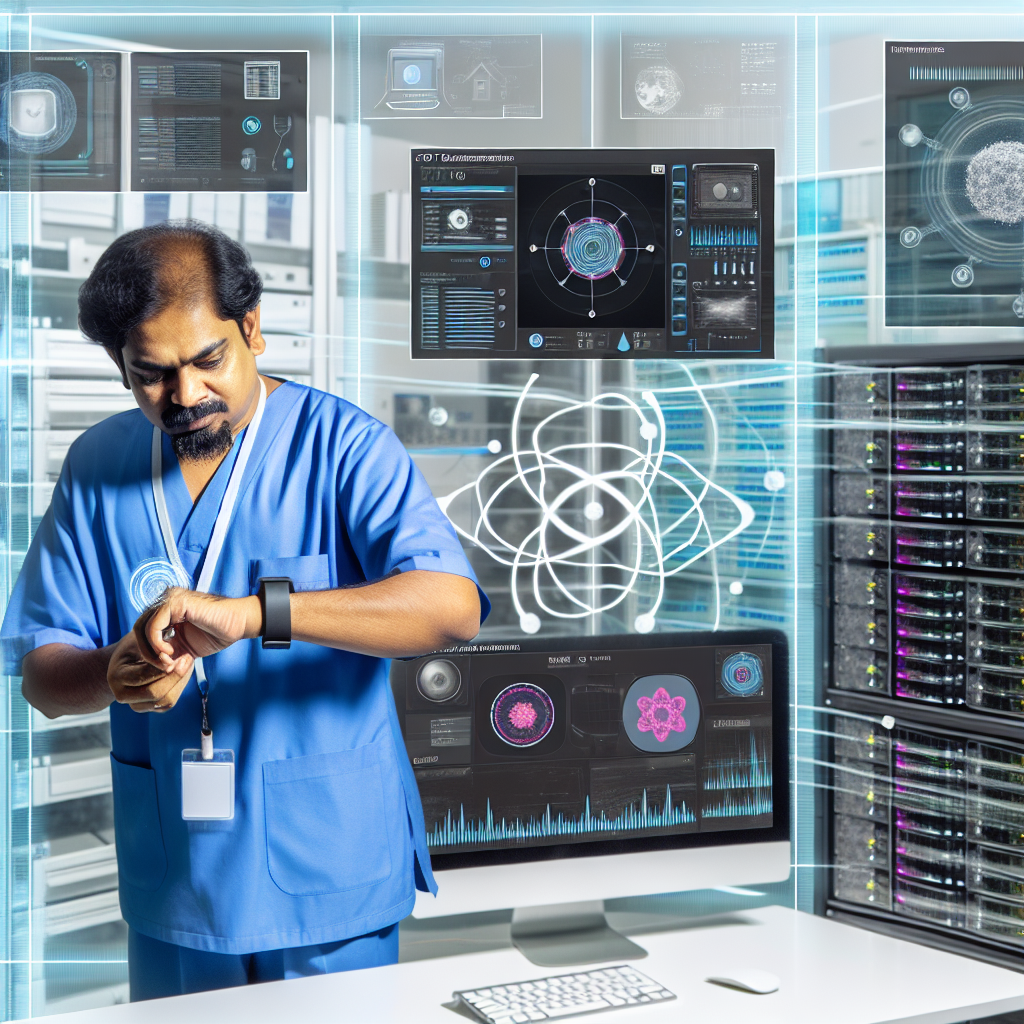Introduction
AI technology is transforming industries at an unprecedented rate.
From healthcare to finance, its applications are vast and varied.
Companies increasingly harness AI for efficiency and innovation.
Among these emerging fields, nutrition stands out as a significant area for AI integration.
Overview of AI in Various Sectors
Businesses now embrace AI to streamline operations and enhance user experience.
In sectors like marketing, AI analyzes consumer behavior to optimize campaigns.
In healthcare, AI assists in diagnosing diseases and recommending treatments.
This trend showcases AI’s capabilities to revolutionize traditional methods across industries.
Emerging Applications in Nutrition
Nutrition and diet are gaining attention as essential areas for AI applications.
AI models help analyze vast datasets related to food and health.
These models uncover patterns that might elude human experts.
Personalized nutrition is now more accessible than ever before.
Consumers seek tailored solutions for their dietary needs and preferences.
Here, AI offers efficient and effective answers.
Purpose of the Blog
This blog aims to explore the rise of AI-powered nutrition apps.
These apps leverage advanced algorithms to generate personalized diet plans.
By analyzing individual data, they provide recommendations that suit specific health goals.
AI-powered apps can adapt to users’ preferences, such as allergies or dietary restrictions.
This level of customization fosters healthier eating habits.
Users can track their progress and adjust their diets dynamically.
The integration of AI in nutrition enhances accountability and engagement.
This development encourages users to make better choices for long-term wellness.
In summary, the intersection of AI technology and nutrition marks a notable advancement.
As we explore these apps, we will highlight their potential benefits.
Understanding how they work will empower users to take control of their diets.
Personalized diet plans have never been more achievable, and AI technology paves the way.
Understanding AI in Nutrition
Definition of Artificial Intelligence in the Context of Health and Nutrition
Artificial Intelligence (AI) refers to the simulation of human intelligence by machine systems.
In the context of health and nutrition, AI enhances the ability to analyze and manage dietary information.
It helps design personalized nutrition plans based on individual needs.
AI provides data-driven insights, facilitating better dietary choices.
Overview of Algorithms Used in AI Nutrition Apps
Nutrition apps utilize various algorithms to process information effectively.
The following are the key algorithms:
- Machine Learning: This allows apps to learn from user behaviors and improve their recommendations over time.
- Natural Language Processing: This enables the app to understand user queries and swap recipes or dietary advice based on contextual hints.
- Predictive Analytics: This analyzes historical data to forecast future dietary trends and user preferences.
- Data Analytics: This identifies patterns in nutritional data to provide tailored nutritional advice.
- Recommendation Algorithms: These suggest foods, recipes, and meal plans based on user profiles and preferences.
The Role of AI in Processing Large Data Sets Related to Dietary Preferences, Nutritional Values, and Health Goals
AI plays a crucial role in managing extensive data sets, simplifying complex nutritional information.
It executes diverse functions, enhancing diet management for users. Here are specific ways AI processes this information:
- Data Collection: AI collects dietary data from users, including food habits, preferences, and restrictions.
- Nutrition Analysis: Apps evaluate the nutritional content of foods by analyzing vast databases of food information.
- Personalization: AI algorithms tailor dietary plans to match each user’s unique health goals, preferences, and restrictions.
- Monitoring and Feedback: These apps track user progress, updating dietary suggestions based on ongoing input and health data.
- Integration with Health Data: Many nutrition apps configure with health wearables, compiling comprehensive dietary and health stats.
With this powerful data processing capacity, AI nutrition apps significantly enhance user experience.
We Design & Develop Websites, Android & iOS Apps
Looking to transform your digital presence? We specialize in creating stunning websites and powerful mobile apps for Android and iOS. Let us bring your vision to life with innovative, tailored solutions!
Get Started TodayThey provide accurate recommendations based on a holistic view of dietary habits and health objectives.
This technology continues evolving, fronting an exciting new era in personal nutrition management.
The strength of AI lies in its adaptability to user input.
For instance, it adjusts meal recommendations as users achieve their health goals.
When a user reports weight loss or improved energy levels, AI re-evaluates their dietary plan to maintain progress.
This dynamic approach ensures that users receive continuous and relevant advice tailored to their changing needs.
Moreover, AI nutrition apps utilize vast resources of scientific research to ground their dietary suggestions.
These apps can access the latest studies on nutrition, enhancing their algorithms with cutting-edge insights.
Such research informs recommendations about macronutrient ratios, vitamin requirements, and dietary supplements.
Additional points
Additionally, the interaction between users and apps contributes to feedback loops.
As AI collects data about what food choices users make, it refines its recommendations.
This constant, iterative process improves the accuracy of dietary advice, leading to better user outcomes.
The integration of AI technologies also fosters community engagement.
Many nutrition apps feature forums and social networks where users can share experiences, challenges, and tips.
By participating in these communities, users stay motivated.
Social support enhances the commitment to achieving individual health goals.
Furthermore, these apps often include features like gamification.
Users earn points or rewards for daily logging of meals or achieving their dietary goals.
This feature enhances user engagement, making dietary changes feel achievable and enjoyable.
AI-driven nutrition apps strengthen their role in public health initiatives.
By making personalized nutrition accessible, they empower users with knowledge about their eating habits.
These tools can potentially alleviate public health issues, such as obesity and diet-related diseases, through tailored dietary interventions.
In summary, AI revolutionizes the landscape of nutrition management.
Users benefit from personalized plans that evolve with their journey.
As technology advances, AI-driven nutrition apps will likely play an even more significant role in health promotion and disease prevention.
Popular examples of AI in nutrition apps include MyFitnessPal, Nutracheck, and Lose It!
Each app utilizes AI algorithms to analyze user data and provide personalized recommendations.
Read: Teletherapy Software for Mental Health Professionals
Benefits of AI-Powered Nutrition Apps
The rise of AI-powered nutrition apps represents a significant advancement in the field of dietary management.
These applications leverage artificial intelligence to provide tailored guidance for users striving to achieve their nutritional goals.
Below, we examine key benefits these apps offer, focusing on personalized dietary recommendations, real-time feedback, enhanced user engagement, and increased accessibility.
Personalized Dietary Recommendations Based on User Inputs
One of the most compelling advantages of AI nutrition apps lies in their ability to deliver personalized dietary recommendations.
Users begin by inputting details such as age, weight, height, gender, and activity level.
The app processes this information to create a unique profile.
- Customized Meal Plans: AI apps generate meal plans specifically designed for individual needs. Users can specify dietary restrictions, like gluten-free or vegan, ensuring recommendations align with their lifestyle.
- Nutritional Goals: Users can set goals such as weight loss, muscle gain, or improved energy. The app tailors suggestions that directly support these objectives.
- Behavioral Tracking: AI can monitor user habits and preferences. It adjusts dietary plans based on previous choices and compliance, providing a more realistic approach to nutrition.
- Macronutrient Ratios: The app calculates the ideal macronutrient balance for users. This helps them understand protein, fat, and carbohydrate intake in relation to their goals.
Real-Time Feedback and Adjustments to Dietary Plans
AI nutrition apps also excel in providing real-time feedback.
We Design & Develop Websites, Android & iOS Apps
Looking to transform your digital presence? We specialize in creating stunning websites and powerful mobile apps for Android and iOS. Let us bring your vision to life with innovative, tailored solutions!
Get Started TodayUnlike traditional methods that rely on static advice, these applications adapt based on user interactions.
- Instant Nutritional Analysis: Users can log meals in real-time. The app analyzes nutritional content immediately, allowing users to make informed choices on the spot.
- Dynamic Adjustments: If users stray from their goals, the app recalibrates. This ensures that dietary plans remain relevant and achievable as they progress.
- Alerts and Reminders: The app sends notifications for meal logging, hydration reminders, and upcoming meals. This fosters accountability and helps maintain engagement.
- Feedback Loop: Continuous input fosters a feedback loop where users gain insights into food sustainability and overall health. They can make educated decisions regarding their diets.
Enhanced Engagement and Motivation Through Gamification and Tracking Features
AI nutrition apps utilize gamification techniques to keep users engaged.
By incorporating game-like elements, these applications create an interactive experience that encourages commitment.
- Progress Tracking: Users can visually track their progress over time. Graphs and charts illustrate trends in weight loss or nutritional intake, motivating users to stay on course.
- Challenges and Rewards: Many apps offer challenges and reward systems. Users earn points or badges for achieving specific milestones, enhancing motivation.
- Community Interaction: Some apps include forums or social features, promoting community support. Users share their journeys and tips, leading to increased engagement.
- Daily Challenges: Encouraging users to complete daily nutritional challenges can boost motivation. Completing a new healthy recipe, for example, keeps dietary management fun.
Accessibility for Various Demographics, Including Those with Specific Dietary Needs
AI-powered nutrition apps are designed with accessibility in mind.
They cater to a diverse range of users, including those with unique dietary needs.
- Diverse Dietary Choices: The apps accommodate specific dietary requirements. They cater to vegans, vegetarians, and users with allergies.
- Multilingual Support: Many apps offer multiple languages. This makes them accessible to non-English speakers, broadening their user base.
- Age Consideration: These apps offer features suited for different age groups. Older adults may require simpler interfaces or specific health-related dietary recommendations.
- User-Friendly Interfaces: Designed with varying tech skills in mind, many apps provide intuitive interfaces. This reduces the intimidation factor for new users.
AI nutrition apps provide a powerful tool for individuals to enhance their dietary habits.
Their capabilities extend far beyond simple meal tracking. Users appreciate the personalized touch, as these apps adjust to their evolving needs.
The accessibility of these apps creates an inclusive environment for various demographics.
In addition, the real-time feedback keeps users informed and motivated.
Gamification elements play a crucial role in maintaining engagement.
By appealing to a broad audience, these apps become essential companions in everyday nutrition management.
As individuals increasingly rely on technology for health and wellness, AI-powered nutrition apps become more integral.
They transform the way people approach their diet and nutrition.
With consistent advancements, these applications will only become more effective in supporting varied nutritional journeys.
Read: Virtual Health Platform: Streamlining Remote Medical Consultations for Busy Professionals
Key Features of AI Nutrition Apps
AI nutrition apps have revolutionized how individuals approach their dietary habits.
These applications utilize advanced algorithms and machine learning techniques to provide personalized diet plans and insights.
Several key features stand out among these innovative tools:
Nutritional Analysis and Food Logging
Nutritional analysis forms the cornerstone of effective diet management.
AI nutrition apps provide detailed insights into the nutritional content of foods.
These apps offer features such as:
- Barcode Scanning: Users can scan food items for instant nutritional data.
- Database Access: Extensive databases allow tracking a wide range of food items.
- Custom Food Entries: Users can add homemade meals and recipes for personalized tracking.
- Nutrient Breakdown: Detailed analyses reveal macro and micronutrient information.
With these features, users easily log their meals and understand the nutritional composition of their diet.
This analysis empowers them to make informed choices.
Meal Planning and Recipe Suggestions Tailored to User Preferences
Meal planning can often feel overwhelming.
AI nutrition apps simplify this process by offering tailored meal plans.
Key features include:
- Personalized Meal Plans: Apps generate meal plans based on dietary restrictions and preferences.
- Dynamic Recipe Suggestions: Users receive recipe ideas that align with their nutritional goals.
- Flexible Adjustments: Meal plans can easily adapt to changing preferences or events.
- Seasonal Recipes: Users enjoy recipes based on seasonal ingredients for freshness.
These personalization features not only enhance user engagement but also ensure that meals remain interesting and aligned with dietary objectives.
Integration with Wearable Devices for Holistic Health Monitoring
Integrating wearable devices with AI nutrition apps fosters a comprehensive view of health.
Users can track various health metrics seamlessly. Important features include:
- Activity Tracking: Wearable devices monitor physical activity levels throughout the day.
- Heart Rate Monitoring: Users can check their heart rate to gauge workout intensity.
- Caloric Expenditure: Integration helps track calories burned during physical activity.
- Sleep Tracking: Monitoring sleep patterns can help evaluate recovery and overall well-being.
This holistic approach allows users to assess how their dietary choices affect their overall health, creating a feedback loop that enhances motivation.
Community Features for Support and Accountability
Building a community around nutrition goals adds another layer of support.
AI nutrition apps often include social features that foster engagement.
Key community features may consist of:
- User Forums: Community forums allow users to share experiences and tips.
- Group Challenges: Users can participate in fitness and nutrition challenges together.
- Peer Support: Users can connect with others for encouragement and accountability.
- Feedback Mechanisms: Users can provide suggestions and reviews on various features.
Having a supportive community motivates users to stay committed to their health journey.
Accountability can significantly enhance adherence to diet plans.
We Design & Develop Websites, Android & iOS Apps
Looking to transform your digital presence? We specialize in creating stunning websites and powerful mobile apps for Android and iOS. Let us bring your vision to life with innovative, tailored solutions!
Get Started TodayBasically, AI-powered nutrition apps have become invaluable tools for many seeking personalized diet plans.
Their key features, including nutritional analysis, meal planning, integration with wearables, and community support, create comprehensive health experiences.
These innovative applications not only make meal management easier but also enhance overall health by providing tailored recommendations.
By leveraging the power of artificial intelligence, users can achieve their dietary goals efficiently.
Read: Interactive Health Game for Kids: Learning Healthy Habits Through Play

Real-World Examples of AI Nutrition Apps
Artificial Intelligence (AI) has transformed various industries, including healthcare and nutrition.
Today, several AI-powered nutrition apps offer personalized diet plans.
These apps utilize advanced algorithms and vast databases to provide tailored nutrition advice.
Below, we explore real-world examples of popular AI nutrition apps.
Overview of Popular AI-Powered Nutrition Apps on the Market
- MyFitnessPal: This app boasts a large food database and calorie tracking functions. Users can log meals and monitor their nutritional intake effortlessly. AI features suggest meals based on personal goals.
- Lose It!: Similar to MyFitnessPal, Lose It! helps users set weight loss goals. The app uses AI to analyze dietary habits and suggest healthier alternatives. Its extensive food library simplifies meal planning.
- Noom: Noom combines psychological approaches with AI-driven insights. It helps users understand their eating behaviors while recommending personalized meal plans.
This app focuses on long-term lifestyle changes. - Eat This Much: This app automatically generates meal plans. Users input their dietary preferences and goals. Eat This Much makes grocery lists based on selected meals, simplifying the cooking process.
- Fooducate: Fooducate emphasizes education about food choices. The app grades foods based on their nutritional value. It helps users make healthier choices while shopping or dining out.
Case Studies of User Experiences and Outcomes
The effectiveness of AI-powered nutrition apps often gets highlighted through user experiences.
Below are several case studies demonstrating positive outcomes.
Case Study 1 – MyFitnessPal:
A user struggled with weight management for years.
By using MyFitnessPal, the user tracked their calorie intake daily.
After 6 months, they lost 15 pounds.
The app’s community support kept them motivated throughout their journey.
Case Study 2 – Noom:
A user joined Noom seeking guidance on better eating habits.
They discovered emotional eating triggers through the app’s coaching.
With Noom’s support, the user adopted healthier eating patterns.
Within 3 months, they lost 10% of their starting weight.
Case Study 3 – Eat This Much:
A busy professional sought a meal planning solution.
They began using Eat This Much for automated meal plans.
This saved them time and decreased food waste.
They reported feeling more energetic due to balanced meals.
Comparisons of Different Apps and Their Unique Features
While many AI-powered nutrition apps offer similar functionalities, each has unique features catering to specific needs.
Here’s a comparison of some popular options
| App Name | Unique Features | Strengths | Weaknesses |
|---|---|---|---|
| MyFitnessPal | Large food database; community features | Effortless food tracking; social motivation | Advertisements in the free version |
| Lose It! | Barcode scanner for easy food logging | User-friendly interface | Limited free features |
| Noom | Behavioral psychology integration | Focus on mental transformation | Subscription cost can be high |
| Eat This Much | Automatic meal generator | Simplifies meal planning | Limited food database |
| Fooducate | Food grading system | Educational resources for users | Less emphasis on meal tracking |
These comparisons illustrate that choosing the right app depends on individual needs.
Some users prioritize detailed tracking, while others benefit from educational resources or meal planning automation.
The customization options enhance user experiences, tailoring diet plans to meet specific health goals.
AI-powered nutrition apps can revolutionize personal diet management.
They not only provide valuable insights and recommendations but also foster accountability and motivation.
As technology continues to advance, the capabilities of these apps will only improve.
Users can expect more enhanced features, making healthy eating even more accessible.
Whether you seek to lose weight, build muscle, or simply eat healthier, these apps offer a pathway to success.
By leveraging AI, users can enjoy personalized nutrition plans that fit their lifestyles and preferences.
The journey toward improved health becomes engaging and enlightening through these technological innovations.
Read: AI-Driven Fitness Coaching for Millennials: A Personalized Experience
Challenges and Limitations of AI Nutrition Applications
AI-powered nutrition applications offer numerous advantages for personalized diet plans.
However, they face several significant challenges and limitations.
Understanding these issues is crucial for users and developers alike.
Below are the main concerns regarding AI nutrition applications.
Data Privacy and Security Concerns
Users of AI nutrition applications often share sensitive personal information.
This can include health conditions, dietary preferences, and even biometric data.
The need to safeguard this information is paramount for any system handling such data.
- Data Breaches: Stray data breaches can expose private user information.
- Identity Theft: Hackers can misuse personal data for malicious purposes.
- Compliance Issues: Applications must comply with data protection regulations.
- User Trust: Loss of trust can occur if there are incidents of data misuse.
Developers must implement robust security measures.
We Design & Develop Websites, Android & iOS Apps
Looking to transform your digital presence? We specialize in creating stunning websites and powerful mobile apps for Android and iOS. Let us bring your vision to life with innovative, tailored solutions!
Get Started TodayThey should encrypt user data and regular audits of security practices.
Transparent privacy policies can further increase user trust.
Regular updates and patches are essential to protect the data.
Accuracy of Nutritional Information and Potential Biases in Algorithms
The accuracy of nutritional information is crucial for effective personalized diet plans.
AI systems often rely on existing datasets that may not be comprehensive or current.
As a result, users may receive misleading dietary advice.
- Outdated Data Sources: Many applications depend on old dietary research.
- Mismatch of Information: Not all foods have standardized nutritional values.
- Bias in Algorithms: Algorithms can have built-in biases affecting dietary suggestions.
- Regional Variations: Nutritional requirements can vary significantly based on location and culture.
To mitigate these issues, developers should continually update their databases.
They need to standardize the information across various food items.
Ensuring that algorithms reflect diverse populations could also help.
Engaging nutrition experts can assist in refining these applications.
The Need for Human Oversight in Dietary Recommendations
While AI provides valuable recommendations, human oversight remains essential.
Personalized dietary plans can sometimes require nuanced understanding and empathy that machines lack.
AI can provide data but might miss important contextual factors.
- Co-existing Knowledge: Human nutritionists possess years of education and experience.
- Behavioral Factors: Humans can better account for psychological and emotional factors.
- Adapting to Changes: A nutritionist can quickly adapt recommendations based on real-time feedback.
- Complex Requirements: Unique health conditions require tailored advice beyond standard algorithms.
Integrating human professionals into AI applications can enhance the user experience.
Collaboration aids in addressing individual needs while utilizing AI’s strengths.
Users might benefit from hybrid models that incorporate technology and human expertise.
Accessibility Issues for Users Who May Not Be Tech-Savvy
Not everyone is well-versed in using technology.
Many individuals may struggle when navigating AI-Powered nutrition apps for diet plans.
This limitation can hinder the potential benefit of personalized diet plans for a significant portion of the population.
- Intuitive Interface: Applications need user-friendly designs for easy navigation.
- Technical Support: Users might require assistance in handling technical difficulties.
- Comprehensive Tutorials: Clear guides can help users understand how to use the application.
- Language Barriers: Translations and cultural adaptations can increase accessibility.
Developers should prioritize creating intuitive interfaces.
Offering tutorials and support services can enhance user experience.
Customizable options can cater to different levels of tech-savviness.
Engaging target demographics for feedback can lead to better design decisions.
Overall, AI-Powered nutrition apps for diet plans applications offer immense potential for personalizing diet plans.
Understanding their limitations is crucial for maximizing benefits.
Addressing issues related to data privacy, information accuracy, and accessibility can enhance user experiences.
Combining AI with human expertise can ensure more effective nutritional guidance.
By overcoming these challenges, developers can unlock further advancements in this burgeoning field.
The Future of AI in Personalized Nutrition
Emerging Trends in AI Technology and Potential Innovations
The landscape of artificial intelligence in nutrition continues to evolve rapidly.
Businesses and researchers collaborate to unveil new opportunities for personalizing diets.
These trends influence various aspects of health, food consumption, and wellness.
Below are some of the most notable emerging trends:
- Machine Learning Algorithms: Advanced algorithms provide deeper insights into dietary preferences. AI learns user habits to recommend precise meal plans.
- Nutritional Bioinformatics: This field combines dietary data with genetic information. It helps tailor nutrition on a personal level.
- Smart Wearables: Devices track physical activity and biometrics in real time. They feed data into nutrition apps for more accurate suggestions.
- Voice Assistants: AI-powered voice assistants simplify meal planning and recipes. Users can easily access meal ideas through simple voice commands.
- Augmented Reality (AR): AR applications visualize food choices and nutritional content. Users gain immediate insight into their meal options.
These innovations signal a promising future for AI-Powered nutrition apps for diet plans apps.
They aim to create a seamless experience for users focused on health.
Predictions for the Evolving Role of AI in Nutrition and Diet Planning
As technology advances, several predictions shape the future of AI in nutrition:
We Design & Develop Websites, Android & iOS Apps
Looking to transform your digital presence? We specialize in creating stunning websites and powerful mobile apps for Android and iOS. Let us bring your vision to life with innovative, tailored solutions!
Get Started Today- Hyper-Personalization: AI will offer increasingly tailored meal plans. Expect recommendations based on individual preferences, health goals, and lifestyle.
- Real-Time Adjustments: Future apps will adjust diet plans in real time. They will consider changes in activity levels and health metrics.
- Enhanced Feedback Mechanisms: Users will receive dynamic feedback based on their food choices. This feedback promotes better decision-making regarding diet.
- Integration with Health Metrics: Nutrition apps will increasingly connect with health devices. They will gather comprehensive health data to refine diet plans further.
- Ethical AI Practices: Developers will prioritize user privacy and ethical guidelines. They will ensure users’ data remains secure and confidential.
These predictions highlight the transformative potential of AI in nutrition.
They promise to empower individuals in their pursuit of healthier lifestyles.
The Importance of Collaboration Between Nutritionists, Dietitians, and AI Developers
The integration of AI in nutrition demands collaboration among various professionals.
Nutritionists and dietitians bring essential expertise to the table.
Their knowledge provides a foundation for developing effective AI applications.
Here are several key reasons for this collaboration:
- Expert Insights: Nutritionists and dietitians understand dietary needs deeply. Their insights guide AI developers in creating relevant algorithms.
- Practical Applications: Collaboration ensures that AI tools remain practical for users. Professionals can test applications and provide constructive feedback.
- Behavioral Understanding: Nutrition specialists comprehend behavioral aspects of dieting. They can inform AI about user motivation and challenges.
- Comprehensive Data Usage: Dietitians can help gather diverse data sets. This data enriches the algorithms for better personalization.
- Research and Development: Continuous collaboration supports ongoing research. This partnership fosters innovations tailored to changing dietary trends.
The synergy between AI developers and nutrition experts is vital.
Together, they create user-centric solutions that meet the needs of diverse populations.
In summary, the future of AI in personalized nutrition appears promising.
Emerging trends and innovations continuously reshape the landscape.
Hyper-personalization, real-time adjustments, and enhanced feedback mechanisms feature prominently.
Collaboration among nutritionists, dietitians, and AI developers will drive this progress.
As we embrace these advancements, individuals will navigate their dietary choices more effectively.
Ultimately, AI-Powered nutrition apps for diet plans apps will revolutionize diet planning and health management.
Conclusion
Recap of the significance of AI-powered nutrition apps for personalized diet plans
AI-Powered nutrition apps for diet plans revolutionizes how individuals craft their diet plans.
These applications analyze user data, such as age, weight, and health goals.
By processing this information, they deliver tailored nutrition recommendations.
Personalized diet plans increase the likelihood of achieving health objectives.
They help users maintain motivation by factoring in their preferences.
The ability to adapt continuously ensures sustained relevance in dietary choices.
Encouragement to consider the benefits of integrating AI technology in their dietary choices
Adopting AI-Powered nutrition apps for diet plans can significantly improve your eating habits.
Users can gain insights that traditional methods may overlook.
These applications foster healthier lifestyles through data-driven choices.
Integrating AI simplifies meal planning and reduces food waste.
Moreover, it promotes accountability by tracking progress effectively.
Consider leveraging these digital tools to enhance your nutritional journey.
Assess your unique requirements to find the most suitable app for you.
A closing thought on the future landscape of nutrition and health through technology
The future of nutrition and health is bright with technological advancements.
As AI continues to evolve, it will enhance dietary personalization further.
These innovations will transform how individuals approach food and nutrition.
Consumers can expect advanced features, such as augmented reality meal planning and real-time dietary adjustments.
Nutrition apps will grow more sophisticated, catering to evolving dietary needs.
Embracing these changes will unlock new possibilities for improved health outcomes.
The intersection of technology and nutrition promises a healthier future for everyone.
Before You Go…
Hey, thank you for reading this blog post to the end. I hope it was helpful. Let me tell you a little bit about Nicholas Idoko Technologies.
We Design & Develop Websites, Android & iOS Apps
Looking to transform your digital presence? We specialize in creating stunning websites and powerful mobile apps for Android and iOS. Let us bring your vision to life with innovative, tailored solutions!
Get Started TodayWe help businesses and companies build an online presence by developing web, mobile, desktop, and blockchain applications.
We also help aspiring software developers and programmers learn the skills they need to have a successful career.
Take your first step to becoming a programming expert by joining our Learn To Code academy today!
Be sure to contact us if you need more information or have any questions! We are readily available.
Put Your Tech Company on the Map!
Get featured on Nicholas Idoko’s Blog for just $200. Showcase your business, boost credibility, and reach a growing audience eager for tech solutions.
Publish Now









